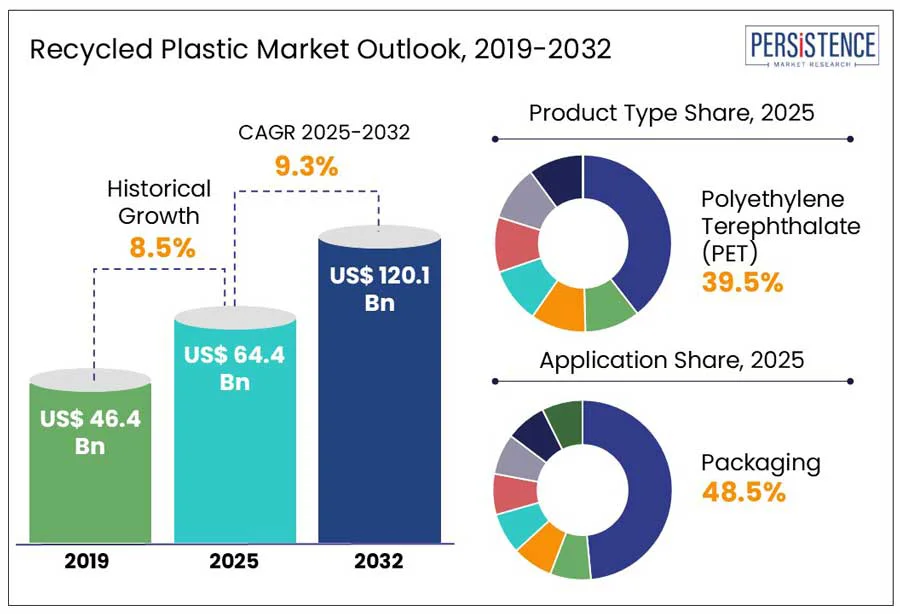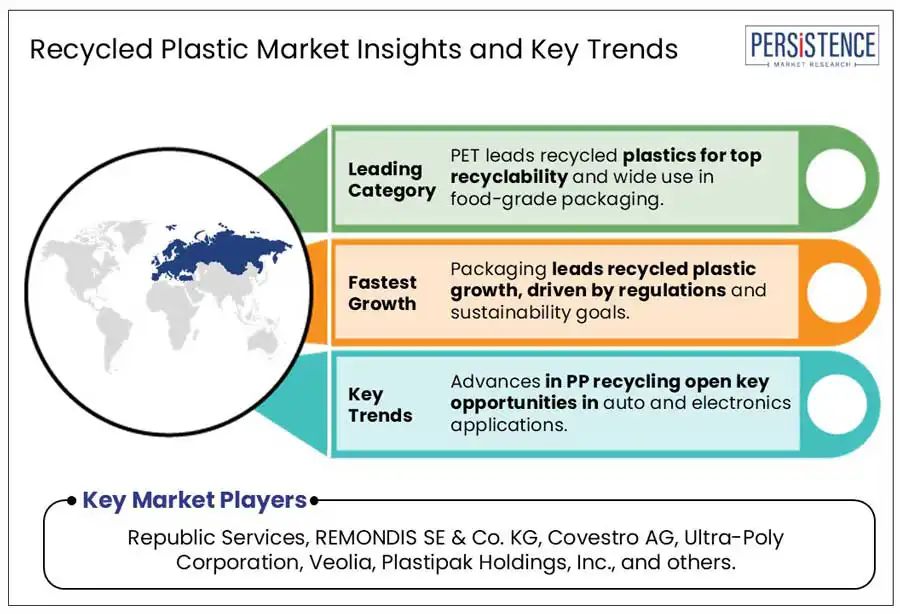ID: PMRREP4348| 196 Pages | 31 May 2025 | Format: PDF, Excel, PPT* | Chemicals and Materials

The global recycled plastic market size is projected to grow from US$ 64.4 billion in 2025 to US$ 120.1 billion by 2032, achieving a CAGR of 9.3% by 2032. According to the Persistence Market Research report, the industry is experiencing significant growth, driven by increasing environmental awareness and stricter regulations. In 2022, the production of circular plastics, which includes recycled and bio-based materials, reached a record 38 million tonnes, accounting for 9.5% of total global plastics production.
Europe has emerged as a leader in this transition, with plastic production from circular sources in 2022. This shift is supported by advancements in recycling technologies and increased investments in chemical recycling, which are crucial for producing high-quality recycled plastics suitable for applications with complex requirements. Despite challenges such as high energy costs and regulatory pressures, the global trend towards a circular economy is evident. Both developed and developing regions are enhancing their recycling capabilities to meet sustainability goals.

Key Industry Highlights
|
Global Market Attribute |
Key Insights |
|
Recycled Plastic Market Size (2025E) |
US$ 64.4 Bn |
|
Market Value Forecast (2032F) |
US$ 120.1 Bn |
|
Projected Growth (CAGR 2025 to 2032) |
9.3% |
|
Historical Market Growth (CAGR 2019 to 2024) |
8.5% |
The recycled plastic market growth is propelled by the rising emphasis on sustainable packaging, particularly within the food and beverage industry. Increasing environmental concerns and regulatory pressure have compelled companies to incorporate recycled materials to reduce plastic waste. Recycled polyethylene terephthalate (rPET) bottles are favored for their durability, lightweight properties, and compatibility with food-grade applications. Rising consumer demand for eco-friendly packaging has further accelerated this shift, prompting major brands to commit to higher recycled content in their packaging.
In 2024, Plastipak Packaging, Inc. partnered with Kraft Heinz, a food company, to transition KRAFT® Real Mayo and MIRACLE WHIP® containers to 100% rPET material. This initiative is projected to eliminate approximately 14 million pounds of virgin plastic. This move supports Kraft Heinz's goal of reducing virgin plastic use by 20% by 2030. Plastipak’s Bottle-to-Bottle recycling program, which recycled over 11 billion bottles in 2023, further underscores the industry's transition toward sustainable packaging solutions.
The growth of the recycled plastic market has been hindered by the absence of standardized collection infrastructure for materials such as films and foams, particularly in developing regions. These materials, due to their lightweight and flexible nature, are often not effectively captured by conventional recycling systems.
They are frequently excluded from municipal collection programs or end up in landfills and open environments. Inconsistencies in sorting technologies and limited investment in waste segregation facilities have further compounded the issue. Without uniform practices for collection and preprocessing, a reliable stream of recyclable feedstock cannot be ensured. Consequently, recyclers face difficulties in sourcing quality input material, which disrupts operational efficiency and limits the availability of high-grade recycled plastic for manufacturers.
Advancements in recycling technologies for polypropylene (PP) are creating significant opportunities in the recycled plastic market, particularly in automotive and electronics applications. Traditionally difficult to recycle due to contamination and degradation, PP is now being effectively processed through innovative chemical recycling and purification techniques. These methods enable the recovery of high-purity PP from complex waste streams, allowing recycled material to meet strict industry standards. As environmental regulations tighten and sustainability goals intensify, the demand for high-performance recycled PP is expected to grow, supporting its use in durable goods and engineered components.
In 2024, Covestro AG strengthened its partnership with Chinese recycling firm Ausell to enhance the recycling of end-of-life automotive plastics. Through this collaboration, automotive headlamps are being converted into high-quality post-consumer recycled (PCR) polycarbonates for reuse in vehicle manufacturing. By deploying advanced recycling technologies, Covestro aims to create a closed-loop system that reduces waste and emissions while promoting resource efficiency.
Polyethylene Terephthalate (PET) has been recognized as the leading segment in the recycled plastic market due to its excellent recyclability and widespread use in food-grade packaging. The material's ability to be recycled into high-quality products without significant degradation has made it a preferred choice for manufacturers. PET bottles, commonly used in beverage and food packaging, are collected in large quantities through recycling programs, providing a steady supply of feedstock for reprocessing. As sustainability concerns increase, the demand for recycled PET (rPET) has been bolstered by regulations and consumer preference for eco-friendly packaging.
In 2024, Republic Services, Inc. opened its Polymer Center in Las Vegas, advancing the recycling of PET. The facility processes curbside-collected PET bottles into rPET flake suitable for food-grade packaging applications. By enabling the bottle-to-bottle recycling process, the center supports the growing demand for sustainable packaging solutions in the food and beverage industry, reinforcing PET's continued dominance in recycled plastic applications.
The packaging industry is recognized as the fastest-growing application segment in the recycled plastic market, driven by regulatory mandates and sustainability goals. Strict legislation in various regions has required manufacturers to reduce dependence on virgin plastics and adopt circular alternatives. Consequently, recycled plastics are increasingly used in bottles, containers, films, and other packaging formats. Brands are compelled to incorporate post-consumer recycled content to comply with regulations and meet environmental commitments. Consumer demand for eco-conscious packaging further reinforces this trend, encouraging packaging producers to innovate with recycled polyethylene terephthalate (rPET), polypropylene (rPP), and other sustainable materials.
In March 2025, Republic Services, Inc. opened a state-of-the-art recycling complex in Indianapolis, including a Polymer Center and a Blue Polymers facility. This facility will produce over 175 million pounds of recycled plastics annually, including food-grade materials for sustainable packaging. By converting curbside-collected rigid plastics into high-quality rPET, HDPE, and PP, this initiative exemplifies the shift toward circularity in packaging.

In North America, the demand for high-grade recycled HDPE and PET is being driven by brand commitments to using 100% recycled content in containers and packaging, supported by increasing consumer awareness and regulatory pressures for sustainable packaging solutions. Companies are adopting circular economy principles, prioritizing the use of recycled materials to minimize their environmental footprint. Recycled HDPE and PET are being increasingly utilized in packaging for food, beverages, and household products. Advancements in recycling technologies are improving the quality and consistency of recycled content, making it more suitable for brand packaging applications.
In 2024, Republic Services, Inc. opened its Polymer Center in Las Vegas, the first facility of its kind in North America. This center processes post-consumer plastic bottles, jugs, and containers into high-quality recycled polyethylene terephthalate (rPET) flake, as well as color-sorted recycled high-density polyethylene (rHDPE) and polypropylene (rPP). The facility is expected to produce over 100 million pounds of recycled plastics annually, supporting sustainable packaging solutions.
In Europe, the integration of recycled polypropylene (rPP) into automotive components is being accelerated by stringent circular economy mandates, such as the European Commission's proposed End-of-Life Vehicles (ELV) regulation, which aims to ensure that 25% of plastics used in new cars come from recycled materials by 2030. This policy is driving automakers to adopt rPP in parts like dashboards and trims, which require both durability and aesthetic appeal. Companies such as BMW and Ford are incorporating rPP into their vehicle interiors to meet sustainability targets and reduce carbon footprints.
In 2024, Veolia and Faurecia advanced their collaboration to integrate rPP into automotive interior components, aiming for 30% recycled content in parts like dashboards and door panels by 2025. Veolia supplies high-quality rPP from its French recycling facilities, while Faurecia focuses on material formulation and design. This partnership contributes to the EU's circular economy objectives and supports the reduction of the automotive industry's carbon footprint.
In the Asia Pacific region, particularly in China and Southeast Asia, the textile industry is undergoing a significant shift toward sustainability, driven by rapid industrialization and urbanization. The adoption of recycled fibers, such as recycled polyester and cotton is being accelerated, with China implementing policies to achieve a 30% textile recycling rate by 2030 and produce three million metric tons of recycled fibers annually. Advancements in recycling technologies and rising consumer demand for eco-friendly products are supporting this transition.
In 2024, Veolia Huafei, a subsidiary of Veolia, was awarded the Outstanding Project Honor at the BRICS Industrial Innovation Contest for its "Blue Cycle" project, which focuses on low-carbon technologies in the recycling industry. This recognition underscores Veolia Huafei's role in promoting sustainable development and ecological transformation in Asia Pacific. The project exemplifies how these regions are adopting recycled fibers in the textile industry, aligning with circular economy principles and resource regeneration efforts.
The competitive landscape of the global recycled plastics market is characterized by key players who are focused on improving recycling technologies and developing sustainable solutions. Major companies are using advanced recycling methods to enhance the efficiency and quality of recycled plastics. They are investing heavily in state-of-the-art recycling infrastructure to meet the demands of high-growth sectors such as packaging, automotive, and construction.
In addition to large multinational corporations, regional players are actively forming local partnerships and collaborations to strengthen their positions in emerging markets. Competition is increasing as governments worldwide introduce stringent regulations, including mandatory recycled content requirements and initiatives to reduce plastic waste. Companies that invest in sustainable practices and circular economy models are better positioned to take advantage of the rising demand for recycled plastics, gaining a significant competitive edge in the global market.
The global Recycled Plastic Market is projected to be valued at 64.4 bn in 2025.
The Recycled Plastic Market is driven by increasing demand for sustainable packaging, especially recycled PET bottles, fueling growth in the food and beverage sector.
The Recycled Plastic Market is poised to witness a CAGR of 9.3% from 2025 to 2032.
Developing advanced recycling technologies for polypropylene (PP) used in automotive and electronics components can unlock high-value applications is the key market opportunity.
Major players in the Recycled Plastic Market include Republic Services, REMONDIS SE & Co. KG, Covestro AG, Ultra-Poly Corporation, Veolia, Plastipak Holdings, Inc., and others.
|
Report Attribute |
Details |
|
Historical Data/Actuals |
2019 - 2024 |
|
Forecast Period |
2025 - 2032 |
|
Market Analysis Units |
Value: US$ Bn, Volume: Unit |
|
Geographical Coverage |
|
|
Segmental Coverage |
|
|
Competitive Analysis |
|
|
Report Highlights |
|
|
Customization and Pricing |
Available upon request |
By Product Type
By Source
By Application
By Region
Delivery Timelines
For more information on this report and its delivery timelines please get in touch with our sales team.
About Author